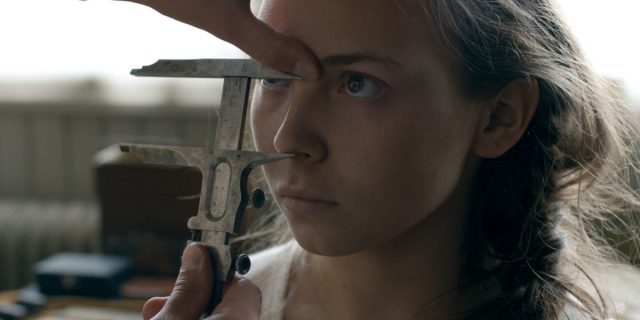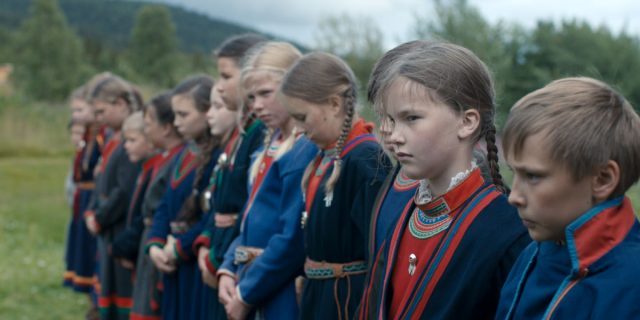
Elle-Marja (Lene Cecilia Sparrok) gets treated like an animal in Amanda Kernell’s Sami Blood
SAMI BLOOD (SAMEBLOD) (Amanda Kernell, 2016)
Landmark Sunshine Cinema
143 East Houston St. between First & Second Aves.
Opens Friday, June 2
212-330-8182
www.levelk.dk
www.landmarktheatres.com
 Inspired by her Sami heritage, Amanda Kernell’s debut feature is a poignant and moving tale of racism, identity, and ethnocentricity in 1930s Sweden. The film begins in contemporary times, as Elle-Marja (Maj-Doris Rimpi) returns to her childhood community for the funeral of her sister. Elle-Marja’s son, Olle (Olle Sarri), and granddaughter, Sanna (Anne Biret Somby), delight in the folk ways of the Sami, but the scouring, elderly woman left her village when she was fourteen and never wanted to come back. “I have no business there with those people,” she says, as if she is not one of them. She resents the language, the traditional clothing, the ritual marking of the reindeer calfs, the yoiking (a form of yodeling) — everything she escaped from. The film soon flashes back to the 1930s, when the young Elle-Marja (Lene Cecilia Sparrok), her little sister, Njenna (Mia Sparrok), and their mother (Katarina Blind) live as nomadic reindeer herders. The girls are sent off to a boarding school where Sami children are taught to speak only in Swedish and the local kids degrade them, referring to them as “filthy Lapps.” Their teacher, Christina Lajler (Hanna Alström), is stern, viciously whacking them across the fingers when they are out of line. Elle-Marja reaches her breaking point when anthropologists Emanuel Wennerberg (Anders Berg) and Hedda Nordström (Beata Cavallin) come to school to measure and photograph the naked girls, treating them like animals. Elle-Marja dreams of living a more fulfilling life, shedding her Sami skin, and she thinks she might have found what she was looking for in Niklas (Julius Fleischanderl), a cultured young Swedish man a few years older than her, but getting away is not going to be that easy for her.
Inspired by her Sami heritage, Amanda Kernell’s debut feature is a poignant and moving tale of racism, identity, and ethnocentricity in 1930s Sweden. The film begins in contemporary times, as Elle-Marja (Maj-Doris Rimpi) returns to her childhood community for the funeral of her sister. Elle-Marja’s son, Olle (Olle Sarri), and granddaughter, Sanna (Anne Biret Somby), delight in the folk ways of the Sami, but the scouring, elderly woman left her village when she was fourteen and never wanted to come back. “I have no business there with those people,” she says, as if she is not one of them. She resents the language, the traditional clothing, the ritual marking of the reindeer calfs, the yoiking (a form of yodeling) — everything she escaped from. The film soon flashes back to the 1930s, when the young Elle-Marja (Lene Cecilia Sparrok), her little sister, Njenna (Mia Sparrok), and their mother (Katarina Blind) live as nomadic reindeer herders. The girls are sent off to a boarding school where Sami children are taught to speak only in Swedish and the local kids degrade them, referring to them as “filthy Lapps.” Their teacher, Christina Lajler (Hanna Alström), is stern, viciously whacking them across the fingers when they are out of line. Elle-Marja reaches her breaking point when anthropologists Emanuel Wennerberg (Anders Berg) and Hedda Nordström (Beata Cavallin) come to school to measure and photograph the naked girls, treating them like animals. Elle-Marja dreams of living a more fulfilling life, shedding her Sami skin, and she thinks she might have found what she was looking for in Niklas (Julius Fleischanderl), a cultured young Swedish man a few years older than her, but getting away is not going to be that easy for her.

Sami Blood explores brutal treatment of Sami children in Sweden
Winner of numerous awards at multiple festivals around the world, Sami Blood is anchored by a breakout performance by first-time actor, and real-life Sami, Lene Cecilia Sparrok, whose sister, Mia, plays Njenna. Lene’s expressive eyes reveal fear and longing, sadness and anger. After getting caught running afoul of the unspoken rules, she is chastised by Christina. “Has Elle-Marja got anything to say?” the teacher asks. Lene first stares blankly ahead at nothing, then turns defiantly to the right, refusing to answer or to even look her in the eye. She wants to learn about the world, and her teacher knows that but, believing the Sami to be racially inferior, teacher refuses to nurture student; it is no mere coincidence that the non-Sami name Lene chooses for herself is Christina. Meanwhile, Kristian Eidnes Andersen’s brooding, ominous score hovers in the background as cinematographers Sophia Olsson and Petrus Sjövik slowly scan the rural landscape, where only darkness and danger await Elle-Marja. It’s a powerful film that relates directly to the world’s treatment of “the other” in the twenty-first century, particularly in regard to refugees, immigrants, and such movements as “America first,” which show disregard for both indigenous and foreign cultures. Bookended by the scenes of the older Christina, which were initially made for Kernell’s 2015 short, Stoerre Vaerie, and partly based on the experiences of her grandmother, Sami Blood is a meditation on the persistence of pain and how time and distance do not necessarily heal the physical and psychological wounds of childhood.